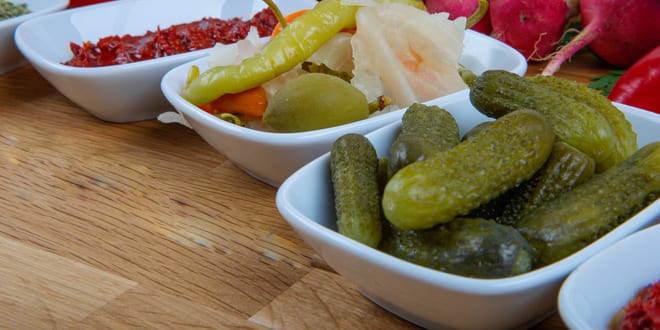A team of Israeli and Chinese researchers believe that a probiotic substance made from a strain of bacteria found in Chinese pickles can prevent cavities.
Dental caries – or holes in the teeth – are the most common disease of the oral cavity. Cavities, which affect nearly every child, teen and adult, are caused by Streptococcus mutans, the most prominent of bacteria. This bacterium adheres to teeth as biofilm (plaque(.
But after extracting strains of Lactobacilli from Sichuan pickles, the researchers discovered that S. mutans was reduced by 98.4%. Lactobacilli are a group of rod-shaped, gram-positive, non-spore-forming bacteria characterized by their ability to produce lactic acid as a by-product of glucose metabolism used commercially during the production of sour milks, cheeses and yogurt, and they have an important role in the manufacture of fermented vegetables (pickles and sauerkraut), beverages (wine and juices), sourdough breads, and some sausages.
Their findings were recently published in Frontiers in Microbiology.
The researchers included Prof. Ariel Kushmaro of Ben-Gurion University of the Negev Biotechnology Engineering department who was the sole Israeli researcher on the team. The Chinese partners in the team came from the department of food science and technology; State Key Laboratory of Oral Diseases at West China Hospital of Stomatology; and the Key Laboratory of Bio-resources and Eco-environment – all at Sichuan University in the city of Chengdu.
They started with 14 types of Sichuan pickles from southwest China. Sichuan-style pickles are naturally fermented. Such pickles are traditionally made in the Far East by taking cucumbers, squash (zucchini), one teaspoon crushed red pepper flakes, combining them with rice vinegar, sugar, kosher salt, Sichuan peppercorns, sugar, star anise and half a cup of water. Then stir, until salt and sugar are dissolved. They should be packed in a sterilized glass jar. Pour brine over the vegetables, cover jar and chill pickles at least 24 hours and up to two weeks.
The team extracted 54 different strains of Lactobacilli and found that one, L. plantarum K41, reduced the incidence and severity of cavities quite significantly. That particular strain was also highly tolerant of acids and salts. Subsequent analysis in vitro (a controlled environment outside of a living organism) and in vivo (in whole, living animals) proved the efficacy of this bacteria strain as a potential for probiotics.
According to the 4th National Oral Health Survey of China, the prevalence of cavities in children aged three though five years ranges from 50% to 71%. The rate is even higher in adults.
The plaque can be removed with tooth brushing and flossing or by rinsing the mouth with mouthwashes containing chlorhexidine. But, wrote the authors, few of these selectively eliminate cariogenic bacteria without disturbing the ecological balance of oral cavity. Therefore, novel therapies like probiotics have gained increasing attention for their antimicrobial activities in dental biofilm.
“Probiotic microorganisms are living microbes that are beneficial to general health of hosts when taken in sufficient quantities. Delivery of probiotics to teeth as a paste or wash may concentrate the probiotic bacteria in the region of dental biofilm and thus may eradicate or diminish more pathogenic bacteria,” they wrote. “Only a few studies have been performed so far on probiotics that can be added to daily foods directly, so an effort to control dental caries using probiotics is still necessary.”
Pickles are traditional fermented foods that are an integral part of the diet in the southwest of China due to their unique taste and beneficial functions.
“Our work demonstrated that L. plantarum K41 isolated from traditional Sichuan pickles had an inhibitory effect on the biofilm formation of S. mutans,” the authors concluded. “Our results offer a potential alternative strategy for the control of oral biofilm/dental plaque and dental caries,” they concluded.
Source: Israel in the News

